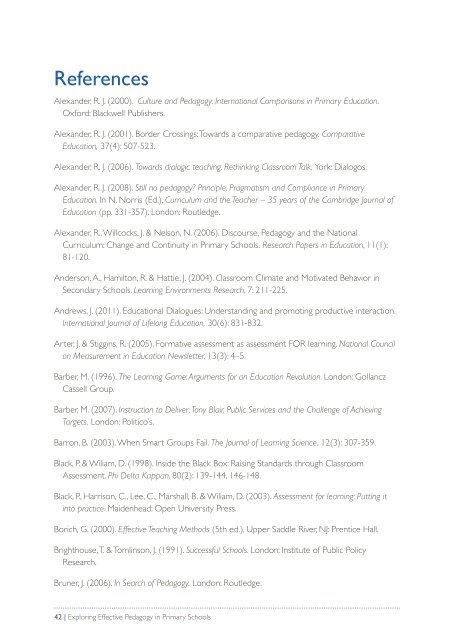Pearson-Exploring-Effective-Pedagogy-in-Primary-Schools
Pearson-Exploring-Effective-Pedagogy-in-Primary-Schools
Pearson-Exploring-Effective-Pedagogy-in-Primary-Schools
Create successful ePaper yourself
Turn your PDF publications into a flip-book with our unique Google optimized e-Paper software.
ReferencesAlexander, R. J. (2000). Culture and <strong>Pedagogy</strong>: International Comparisons <strong>in</strong> <strong>Primary</strong> Education.Oxford: Blackwell Publishers.Alexander, R. J. (2001). Border Cross<strong>in</strong>gs: Towards a comparative pedagogy. ComparativeEducation, 37(4): 507-523.Alexander, R. J. (2006). Towards dialogic teach<strong>in</strong>g. Reth<strong>in</strong>k<strong>in</strong>g Classroom Talk. York: Dialogos.Alexander, R. J. (2008). Still no pedagogy? Pr<strong>in</strong>ciple, Pragmatism and Compliance <strong>in</strong> <strong>Primary</strong>Education. In N. Norris (Ed.), Curriculum and the Teacher – 35 years of the Cambridge Journal ofEducation (pp. 331-357). London: Routledge.Alexander, R., Willcocks, J. & Nelson, N. (2006). Discourse, <strong>Pedagogy</strong> and the NationalCurriculum: Change and Cont<strong>in</strong>uity <strong>in</strong> <strong>Primary</strong> <strong>Schools</strong>. Research Papers <strong>in</strong> Education, 11(1):81-120.Anderson, A., Hamilton, R. & Hattie, J. (2004). Classroom Climate and Motivated Behavior <strong>in</strong>Secondary <strong>Schools</strong>. Learn<strong>in</strong>g Environments Research, 7: 211-225.Andrews, J. (2011). Educational Dialogues: Understand<strong>in</strong>g and promot<strong>in</strong>g productive <strong>in</strong>teraction.International Journal of Lifelong Education, 30(6): 831-832.Arter, J. & Stigg<strong>in</strong>s, R. (2005). Formative assessment as assessment FOR learn<strong>in</strong>g. National Councilon Measurement <strong>in</strong> Education Newsletter, 13(3): 4–5.Barber, M. (1996). The Learn<strong>in</strong>g Game: Arguments for an Education Revolution. London: GollanczCassell Group.Barber, M. (2007). Instruction to Deliver: Tony Blair, Public Services and the Challenge of Achiev<strong>in</strong>gTargets. London: Politico’s.Barron, B. (2003). When Smart Groups Fail. The Journal of Learn<strong>in</strong>g Science, 12(3): 307-359.Black, P. & Wiliam, D. (1998). Inside the Black Box: Rais<strong>in</strong>g Standards through ClassroomAssessment. Phi Delta Kappan, 80(2): 139-144, 146-148.Black, P., Harrison, C., Lee, C., Marshall, B. & Wiliam, D. (2003). Assessment for learn<strong>in</strong>g: Putt<strong>in</strong>g it<strong>in</strong>to practice. Maidenhead: Open University Press.Borich, G. (2000). <strong>Effective</strong> Teach<strong>in</strong>g Methods (5th ed.). Upper Saddle River, NJ: Prentice Hall.Brighthouse, T. & Toml<strong>in</strong>son, J. (1991). Successful <strong>Schools</strong>. London: Institute of Public PolicyResearch.Bruner, J. (2006). In Search of <strong>Pedagogy</strong>. London: Routledge.42 | <strong>Explor<strong>in</strong>g</strong> <strong>Effective</strong> <strong>Pedagogy</strong> <strong>in</strong> <strong>Primary</strong> <strong>Schools</strong>


